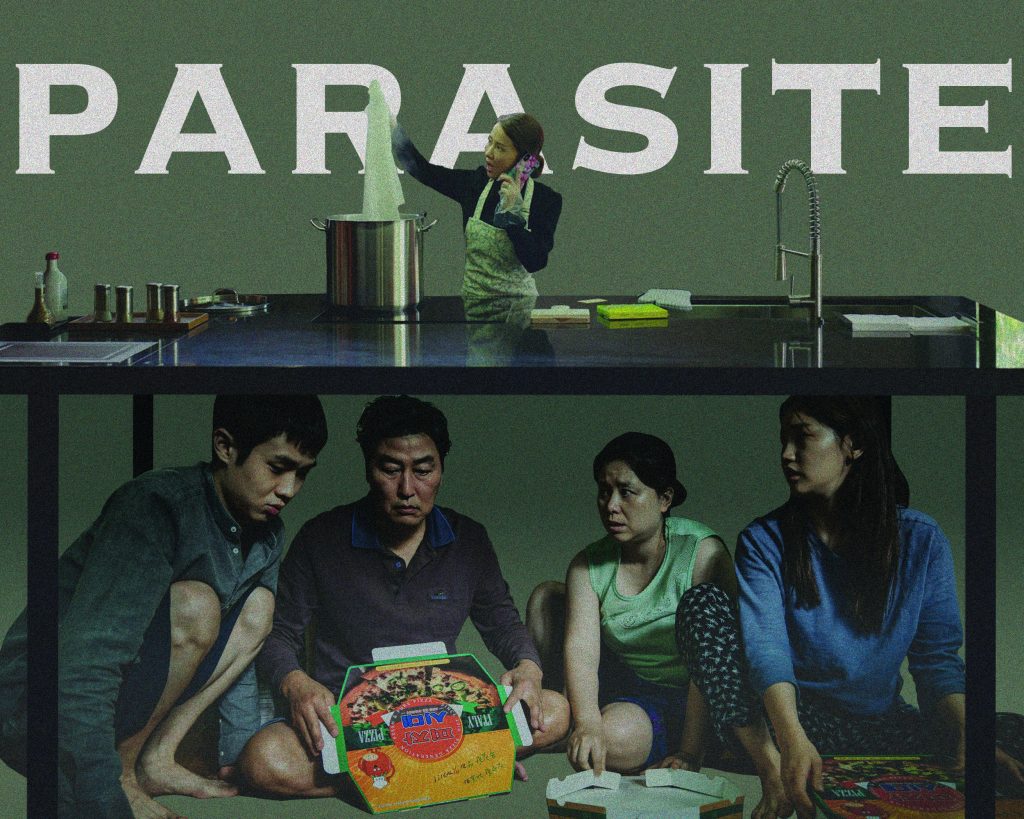A dissection of Parasite’s commentary on the wealth class divide

Joon-Ho’s take on the layers of the wealth class divide is another reason why this masterpiece deserves all this attention. Photo illustration by Riggs Zyrille Vergara
By Riggs Zyrille Vergara, Photo Editor
Overrated or not, awards season has come and gone, and one of the many standout masterpieces of 2019 is the dark comic thriller, Parasite. Co-written and directed by South Korean director Bong Joon-Ho — also known for his work directing Okja and Snowpiercer — Parasite became the first non-English language film to win the best picture Academy Award, in addition to a win at the Golden Globes and the Palme d’Or at Cannes Film Festival. Focusing on the Kims, an impoverished family, the film follows them as they infiltrate the affluent Park household by working for them as unrelated skilled individuals.
Witnessing Joon-Ho’s strokes of genius, like the stitched shots achieved to precisely recreate his storyboards, was an amazing experience. But aside from the meticulous film techniques, Joon-Ho’s realistic take on the many layers of the wealth class divide is another reason why this masterpiece deserves all this attention.
Breaking tropes
The Kim and Park families weren’t the usual TV caricatures of the rich and the poor. The rich Park family weren’t corrupt corporate employees, spoiled brats or even eccentric millionaires. The portrayal of the Kim family also didn’t rely on the poverty porn trope. As Joon-Ho said in an interview with Cult MTL,“In films, you often see stereotypes of rich people who are malicious and very greedy. But, in real life, no one’s really like that. The poor family [in the movie] does end up doing bad things — they are con men — but you also see their clumsy side.” This intentional portrayal intensifies the realistic effect of the fundamental identities of the characters.
Parallels and privilege
The film gives an incredible depiction of how different elements of society can look, and feel different depending on one’s privilege. At the climax of the film, the Kim family’s home is flooded by a storm. Due to their community being situated in a geographically lower area of the city, and living in a semi-basement, they have to frantically salvage their belongings in neck-deep grimy water. They also have to sleep on the floor of a jam-packed evacuation center beside hundreds of other residents. The morning after, Park Yeon-kyo – the matriarch of the Park family – nonchalantly tells her friend that, “Today the sky’s so blue and there’s no pollution in the air. It’s all thanks to that rain.”
Another big element of the film that points to the disparity between the families is the Parks’ complaint about the Kim father, Ki-taek’s smell. Dong-ik, the Park counterpart, described Ki-taek’s smell like “an old radish” or “a boiled rag”. Yeon-kyo was also seen in some scenes covering her nose when she’s around Ki-taek. This was Ki-taek’s tipping point, he suddenly stabbed Dong-ik when Dong-ik, trying to get his car keys from underneath the dying body of Geun-se – the first underground inhabitant of the Park house – covered his nose. The fact that element was only subtly yet repetitively portrayed in the initial parts of the film goes to show that small acts of disgust like these can build up and torment a person if repeatedly experienced from many people. It was a clear-cut act of microaggression.
A seemingly harmless practice seen in the film that further comments on the wealth divide is the use of referrals for job-hiring. In this film, it looked helpful to the Kims. It’s how they got their jobs. But they had to use deception because in the real world, this chain of recommendations is what hurts the chances of anyone outside the wealthy circle from getting a job. Even Yeon-kyo said, “I only trust someone recommended by a person I know well.” The Kim family wouldn’t even possibly have met the Parks if it weren’t from a recommendation from another rich person they know.
Who is the true parasite?
The most innovative take the film does on the wealth divide is that it didn’t have any clear heroes and villains. Each character had its own good and bad qualities. The decision on who to root for solely relies on the audience. It begs the question, “Who is the true parasite?” Is it the poverty-stricken Kims who deceived the Parks and latched themselves onto that household and a circle where they clearly do not belong? Or is it the well-off Kims who, without the exploitation of labor of the lower-class, wouldn’t have that kind of wealth in the first place?
This film’s depiction of rich and poor families shows us that things are not always clear-cut or black and white. Joon-Ho emphasizes this point in his interview with Cult MTL, “Everything is in grey zones in this movie.” Those grey zones show us that there are reasons behind every action. Yes, there will always be consequences and accountability. But it still pays to contemplate the reasoning behind that action, because it opens so many doors for meaningful conversations.




